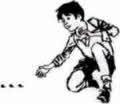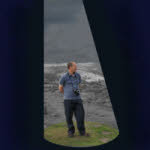John Wales, born in 1923, tells us what he can remember about the 1930s school playground:
Table of Contents:
Playtime games in the 1930s school playground
Among the games we boys and girls played in the playground in the 1930s, Earith were ‘Big Harry’ and ‘Little Harry’, both forms of Tag.

The boys also played a very rough contact game where one team jumps onto the bent backs of the other team and tries to break the chain.
In another game, a boy with a knotted bicycle tube chased you around and whacked you if he could!
The Headmaster had a box made that would hold a single cricket wicket and he would put a sixpence on top of it and we would bowl at it with a cricket ball, trying to hit the wicket and win sixpence.
1930’s school memories of being part of the ‘Empire’

Sometimes we formed up in the playground in lines and did light physical exercise known as ‘drill’ – swinging your arms and bending your trunk.
Then once a year on Empire Day a Union Jack was flown from a window and we all marched past and saluted it.
The very idea of a day that would…
Historic UK 1
‘remind children that they formed part of the British Empire, and that they might think with others in lands across the sea, what it meant to be sons and daughters of such a glorious Empire.’, and that:
‘The strength of the Empire depended upon them, and they must never forget it.’, had been considered as early as 1897.
The image of a motherly Queen Victoria, Empress of India, as its paramount ruler would be shared by an Empire spanning almost a quarter of the entire globe.
However it was not until after the death of Queen Victoria, who died on 22 January 1901, that Empire Day was first celebrated.”
The children were thrown sweets – like feeding chickens…
![[11] 1930s school playground 1 Two chickens. 1930's school playground.](https://notmanywise.uk/wp-content/uploads/rooster-g432cd5524_1280-min.jpg)
We had play times mornings and afternoons and I remember when I was in the infants class Mr Jewson, who lived nearly opposite the playground in the house called ‘Cavendish’ used to go to Mickey Day’s sweet shop and buy a large paper bag full of liquorice Allsorts.
He then came to the playground railing and threw the sweets out as though he were throwing corn at chickens.
We would scrap and fight for these sweets and once you were back at your desk you arranged your spoils, say five sweets, in the groove made for your pencil.

We looked forward to seeing Mr Jewson, for you had just 1d (that is 1 old penny which equals 0.4p now) for the whole week, if you were lucky.
With this you would buy a half-penny Sherbert Fountain and, because they lasted a long time, a half penny’s worth of Aniseed Balls.
Outside of school games
Outside school our main games were ‘Tap and Whip’, ‘Marbles’, ‘Conkers’ and ‘Hoops’ – all played in the streets as there were very few motor cars.
We also played ‘Hare and Hounds’ – the Low Bridge was ‘home’ and the hares went off and hid anywhere in the village, mainly the orchards and hedgerows.
Meanwhile the ‘hounds’ would try and catch them before they got back to ‘home’.
This was ideal practice for many of us who went into the army a few years later.
![[11] 1930s school playground 2 Players cigarette cards. Outside of the 1930s school playground.](https://notmanywise.uk/wp-content/uploads/Players-cigarette-cards.jpg)
We also collected cigarette cards from Players’ packets; these were educational in a way as you learnt about the topic on each set of cards – maybe butterflies, chickens or great cricketers – and did swaps with your friends.
Written by Jack Wales February 2008.
The next article [12] Earith parades 1936 to 1960
Or see the first article in this series: [1] 1930s Earith National Fishing attraction
Reference and credit – opens in a new window:

